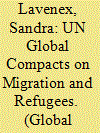| Srl | Item |
| 1 |
ID:
155665


|
|
|
|
|
| Summary/Abstract |
Based on findings from three years of site-intensive fieldwork at the local level, this article presents evidence to suggest that binary governance frameworks like centre–local relations are insufficient to understand certain local regulatory outcomes in contemporary China. I seek to specify a distinct type of local governance that has been emerging in recent years, which blurs existing binary concepts. It can be distinguished along two main dimensions: ostensible structure and modalities of governance. Two cases are analysed to illustrate the ways in which it impacts local regulatory outcomes. The analyses point to the need for expanding our portfolio of approaches to understanding local governance in contemporary China.
|
|
|
|
|
|
|
|
|
|
|
|
|
|
|
|
| 2 |
ID:
152742


|
|
|
|
|
| Summary/Abstract |
Global governance is increasingly about measuring, ranking, and scoring. Focusing on the case of international development, this article suggests that we can learn a great deal about the recent changes in global dynamics by examining the rise of measurement-driven governance. The article engages with the recent scholarship on new governance, particularly the emerging literature on more experimentalist forms of governance. This study finds some evidence of a more experimentalist kind of governance in international development, but suggests that the specific technologies of measurement and accountability through which these new structures of decisionmaking are being facilitated are far from politically neutral. They are instead sources of considerable power that, in many instances, reinforce existing asymmetries and undermine the deliberative potential of these governance practices.
|
|
|
|
|
|
|
|
|
|
|
|
|
|
|
|
| 3 |
ID:
175402


|
|
|
|
|
| Summary/Abstract |
As process-oriented, inclusive, legally nonbinding frameworks deemed to promote cooperation in the pursuit of agreed objectives, the Global Compacts for Migration and Refugees adopted in December 2018 introduce modes of experimentalist governance in fields where states have hitherto opposed (new) multilateral commitments. This article retraces the introduction of experimentalist elements in the compacts’ architecture and critically discusses their potential and limits in such contested policy fields. It concludes that given the depth of normative and distributive conflicts, the compacts are unlikely to generate substantive innovation, as experimentalist theory would suggest. They may, however, help to counter the erosion of existing commitments.
|
|
|
|
|
|
|
|
|
|
|
|
|
|
|
|